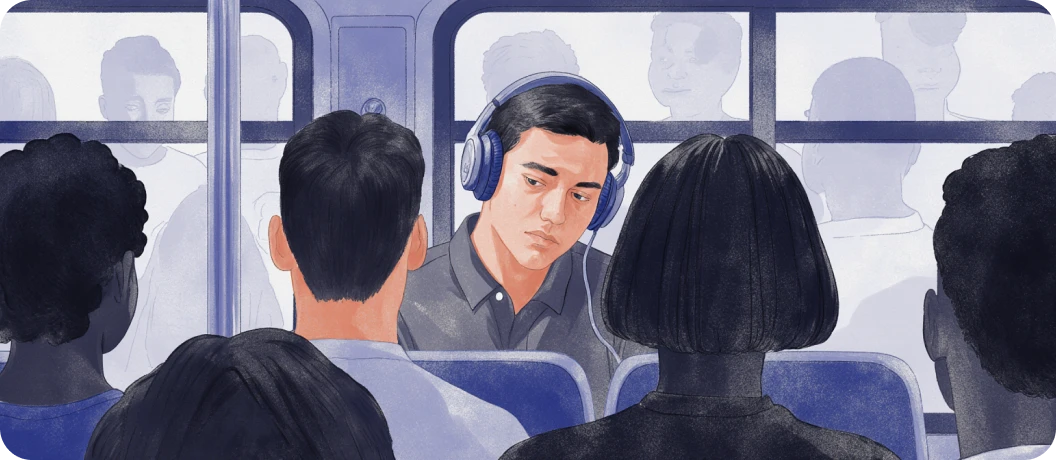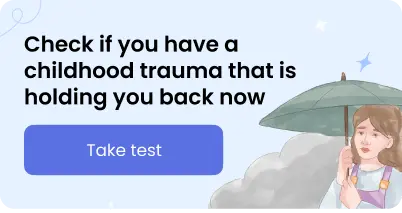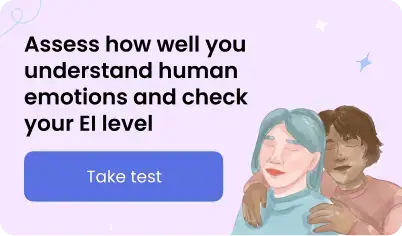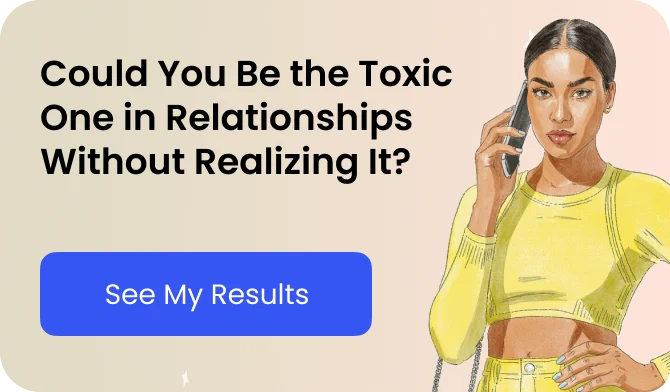Have you ever thought, “I hate people”, whether it’s a friend who ghosted you, a family member who never listens, or a stranger who cuts in line? Were these feelings so strong that you felt like you were boiling?
Sure, we all experience strong negative emotions and can feel outbursts of anger or resentment reaching the point of hatred of people. However, most of these emotions rise and fall.
Instead, hatred becomes more of a pattern of negative thinking and can reveal other, deeper personal issues. Let’s explore the reasons, from personal experiences, family background, and stress to societal influences.
Why Do I Hate Everyone? Potential Reasons
Hatred can show up as an emotion, feeling, or emotional attitude, according to research on the psychology of hate [1]. Here are the possible reasons for these strong negative emotions:
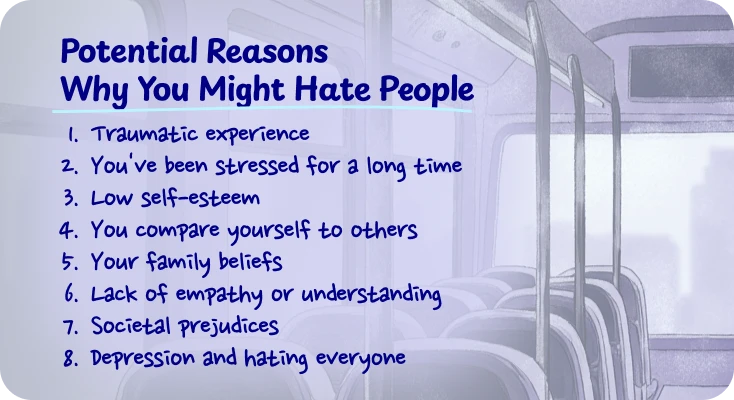
1. Traumatic experience
Childhood trauma or any other emotional or physical negative experience can change perceptions of people. Those who have experienced abuse or childhood emotional neglect might see others as potential threats. This could include:
Betrayal of Trust
Being let down by friends, partners, or family can lead to a general mistrust of others. For example, if you had emotionally immature parents, or your parents have been inconsistent in their parenting and regularly failed to keep their promises to you. They may have said they’d do something, but never did. Or they might have acted loving and compassionate to you in one moment, only to be harsh or cruel the next.
Such repeated betrayals from loved ones might make anyone a cynical and isolated person, wondering, “Why do I hate everyone?”.
Another example would be betrayal in a romantic relationship with a partner. The pain of deception, disappointment, and shattered hopes and plans can be so intense that you may think, “I hate everyone,” and wonder how to stop overthinking after being cheated on.
Bullying or Harassment
Experiencing bullying during childhood or adolescence can influence mental health and make a person hostile towards people. Such intense feelings can start a cycle of bullying. Research on bullying shows that it often comes from feeling threatened, like thinking, “Everyone is going to bully me” [2].
A person experiencing bullying can develop negative thought patterns. They might think, “I’d better ruin their reputation before they ruin mine”. It can lead to social anxiety and cause them to act aggressively in social situations to feel like they’re in control in adulthood.
Parental Criticism
Constant criticism, disappointment, or unrealistic expectations from parents can become a reason for feeling like a failure and resentment toward others. For instance, maybe your parents pressured you academically. Nothing felt good enough, though, no matter how much you tried to succeed. This resentment can turn into a feeling of “I hate everyone who reminds me of my own struggles”.
Start by taking the compassionate childhood trauma test to figure out how early life experiences may be influencing your thoughts and reactions today.
2. You’ve been stressed for a long time
A 2023 study shows that hatred is a mindset triggered by stressful external events [3]. When stress persists, it may lead to outbursts of anger and hatred, making one wonder, “Why am I always angry and irritated for no reason?”.
Imagine a person who works under pressure for a long time. They have increasing workloads, overtime, tight deadlines, and demanding supervisors with unrealistic expectations. This person feels chronic stress that gradually turns into physical and mental health symptoms like fatigue, headaches, and irritability. The constant pressure and exhaustion may cause burnout and bursts of anger.
Consequently, they might show hostility toward coworkers or supervisors and blame them for their suffering. Instead of resolving the underlying issues of stress, they may start to think, “Why do I hate everyone so much?”
If you want to improve your emotional intelligence in the workplace, take an insightful Emotional Intelligence Test to understand how well you connect and communicate with people.
3. Low self-esteem
People with low self-esteem may feel insecure and vulnerable, which can make them defensive. They might believe that others won’t accept or value them. As a result, they may become hostile to people to protect themselves from the pain of feeling worthless.
This irritability may become their coping mechanism, which allows them to project their insecurities onto others. They may humiliate other people and self-affirm at their expense, distracting attention from their own perceived flaws.
Struggling with insecurity or defensive behaviors? Take the “Am I Toxic?” Test to gain deeper insights into your patterns and discover how to build healthier, more balanced relationships.
4. You compare yourself to others
Unfavorably comparing your life to people who are seen as more successful, attractive, or popular can result in insecurity and jealousy. This can be relevant when interacting with people who exhibit narcissistic traits. They may feel jealous of people who have achieved more than they have, or who have what they desire, as research on narcissism shows [4].
Comparing yourself to others can make you feel worthless and unhappy. You may think, “They don’t deserve this”, or “I hate everyone who gets what they want so easily”. Eventually, obsessively comparing may transform into hatred of people. What began as jealousy can manifest as deep-seated hostility. You may even find yourself actively wishing the other person failure or feeling a sense of satisfaction when something goes wrong for the other.
Do you often compare yourself to others?
5. Your family beliefs
Parents are the biggest role models for kids, shaping their worldview. If a kid is raised in a home filled with constant fighting, criticism, or negativity, they might pick up on those thought patterns. This can lead to a general distrust of others.
If parents show a cynical attitude, doubting others’ motives or frequently putting them down, kids are likely to adopt those views. When they see kindness met with suspicion or sarcasm, they might start to think that being nice is just for show. In families that focus on fear to keep safe, children may learn to view the world as a dangerous place.
Moreover, frequently repeated parental phrases can make a child reject and hate certain traits of people. For example, “Don’t be so soft-hearted and spineless, it’s disgusting”, “Stop crying; it’s embarrassing”, and “You’re just trying to get attention.” Such expressions remain deep in the child’s mind.
Already in adulthood, they may wonder why they have such strong negative feelings toward sensitive and emotional people or why they dislike almost everyone who speaks loudly and attracts attention.
American existential psychiatrist Irvin D. Yalom describes such a case of his patient, Carol, in his book “Lying on the Couch”. Carol was abandoned by his father and grew up with a mother who was deeply unhappy and lived her life in regret.
Naturally, this environment shaped Carol’s worldview. Her learned beliefs made it difficult for her to form healthy, trusting relationships. She reacted to potential partners with suspicion and defensiveness. Even in marriage, these patterns made her feel alone and unhappy. Mirroring her mother’s attitude kept her stuck in a cycle of hatred for her husband and all men.
6. Societal prejudices
Cultural and familial beliefs about race, gender, class, ideological differences, and other social categories can also shape attitudes and create cognitive distortions. For instance, if a family has prejudices against certain groups, children may absorb these biases. Later, they can express hostility to anyone perceived as “other” and wonder, “Why do I hate people so much?”.
In the same way, belonging to a particular group in adulthood can create an “us vs. them” mentality. People may feel a sense of loyalty or superiority toward their group, believing “I dislike people who are different from us”.
7. Lack of empathy or understanding
Have you ever thought you couldn’t stand someone, and then that person became your friend? This might happen when we misinterpret the behavior of others. Focusing only on our own feelings can keep us from seeing what others are going through.
It’s possible that you don’t hate them, you just can’t get them. When someone can’t see things from another person’s perspective, it’s tough to connect. They might quickly jump to negative conclusions and feel threatened by people they don’t understand, which makes them defensive. Eventually, misunderstanding the motivation of others can lead to the question, “Why do I hate everyone for no reason?” and may even make you suspect that you live with psychopathy or sociopathy.
Another explanation for the feeling of strong dislike for people can be misanthropy, literally translated as ‘hatred of people’ [5]. People with misanthropy may express feelings of hatred or contempt toward human behavior, society, or the impact humans have on the world.
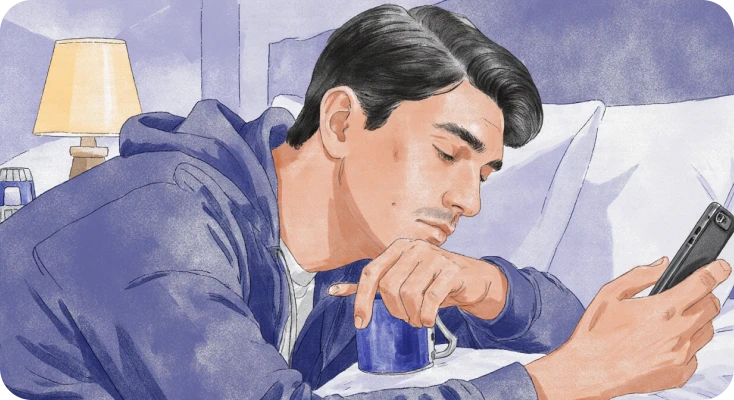
8. Depression and hating everyone
Every person may experience situational emotional responses like frustration or temporary resentment from time to time. However, according to the DSM-5, symptoms such as persistent sadness, irritability, and excessive guilt are diagnostic markers of Major Depressive Disorder. Similarly, in Borderline Personality Disorder (BPD), intense and unstable emotions, including sudden shifts between idealization and devaluation in relationships, are common.
Conditions such as depression or personality disorders can change self-perception and how someone sees the world and other people. Feelings of self-hatred are a common feature of depression [6].
People with depression may think, “Why do I hate myself?” or “I hate my husband,” and may also redirect their pain and hatred away from themselves and onto others. If such patterns are persistent or emotionally overwhelming, the person may need professional diagnosis and support.
What To Do When You Hate Everyone?
If you experience intense emotions, feeling like you hate people, it can negatively affect your well-being. Here’s what you can do to deal with the hatred of people:
1. Understand The Specific Triggers
Finding out what triggers your feelings of hatred is a good first step. If you are asking yourself, “Why do I hate people?”, try the following:
- Think About Where You Are When You Feel Hatred
Does it happen that in a certain situation, you think, “Why am I so sad and depressed for no reason?” Understanding how some stressful places or people affect your emotions can help you make changes to reduce triggers. You can also take our anger issues test to better understand your anger experiences.
- Review Your Beliefs
Hatred of people comes from negative thoughts about yourself or others. For example, you may believe that people will always let you down, or that everybody is trying to judge you. Questioning thoughts like this can help you see things from other perspectives.
- Explore Emotional Responses
Try to think about how you typically react when triggered. Do you pull away, get angry, or express your feelings differently? Understanding your reaction and coping strategies can help you find healthier ways to cope and communicate when you feel hatred.
With Breeze, you can use the mood tracker to better understand your feelings daily and identify emotional trends and triggers. You may also add context to your emotions with short mood notes.
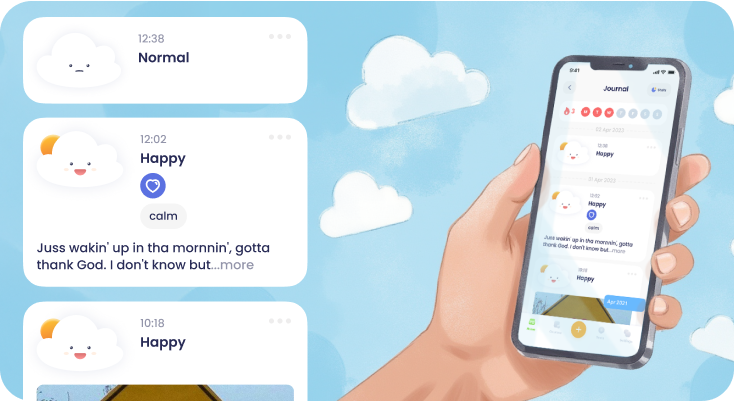
- Write Your Thoughts
Use Breeze journaling to write down moments when you felt hatred for people, including the details of what happened and how you reacted. Writing your thoughts and feelings can help you see connections that may not be obvious at first and get valuable insights into your personality.
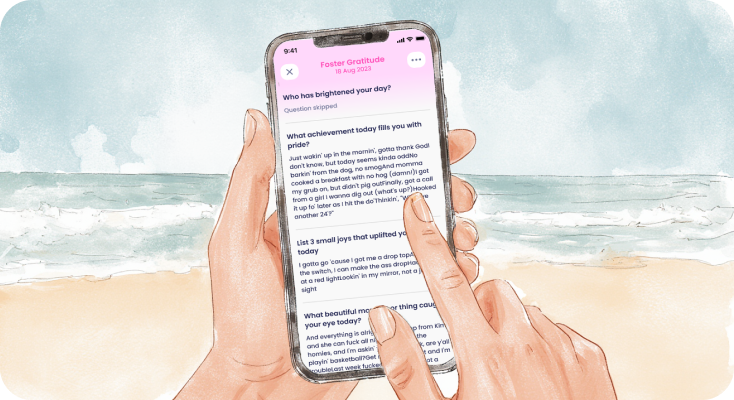
2. Therapy and Counseling
When the question “Why do I hate people?” is persistent and overwhelms you, consider talking to a mental health professional. Therapy offers a safe space to express anger and frustration. It can provide strategies to work through these feelings and practice empathy.
Moreover, a mental health professional can guide you in identifying patterns from your past to find the root causes of your feelings. It may be trauma, upbringing, or relationship behaviors. These deeper insights and self-care can help you change your mindset and improve your mental well-being.
3. Mindfulness and Meditation
If you have thoughts like “I hate people,” mindfulness and meditation can be powerful tools to improve your mental health. You can also try to keep a gratitude journal. Expressing gratitude can help shift your focus from negative feelings to positive ones.
Take time to think about what you’re really thankful for. If you’re not sure where to start, use questions like “What made me smile today?” or “What’s something I take for granted?”
4. Work on Empathy and Understanding
Ask questions about others’ experiences and try to understand their motivation and challenges. Think about the circumstances that may have shaped someone’s behavior. It can provide insight into their actions and help you overcome black and white thinking.
Besides, you can try empathy mapping. Create a visual representation of what someone might think, feel, say, and do. This exercise helps you step into their shoes, understand their perspective, and soften how you feel in your daily interactions with others.
5. Explore Personal Values
Feeling like you hate everyone comes from a conflict between your core values and what those around you do. When your beliefs don’t match what you see in people, it can make you feel left out. This is how you can figure out your values:
- Identify Your Core Values
Think about what’s really important to you. Values like honesty, kindness, or respect might come to mind. Knowing your core beliefs can help explain why some behaviors bug you or make you mad. Everyone is entitled to their values, but if someone holds significantly different values from you, the situation may be a trigger influencing your mental health.
- Recognize Conflicts
After you’ve figured out your values, think about times when you feel like you hate people. Are there things others do that directly conflict with your beliefs? For example, if you value honesty, you might get mad and feel like you hate people who lie. Noticing these conflicts can help you understand your feelings better.
- Set Boundaries
When you notice behaviors that don’t match your values, you can set boundaries. Think about what kinds of interactions you’re okay with and which ones you want to avoid. You’re allowed to have non-negotiables.
Setting boundaries isn’t about shutting people out; it’s about practicing self-care and protecting your emotional well-being. For example, if you value kindness but find yourself in a group where people often gossip, you might choose to step back from those conversations. You could let your friends know that gossip makes you uncomfortable.
- Surround Yourself with Supportive People
When you spend time with those who are kind and respectful, it can help you move past bad experiences and improve your overall mental health. It may also cultivate a more positive outlook and provide a sense of much-needed connection.
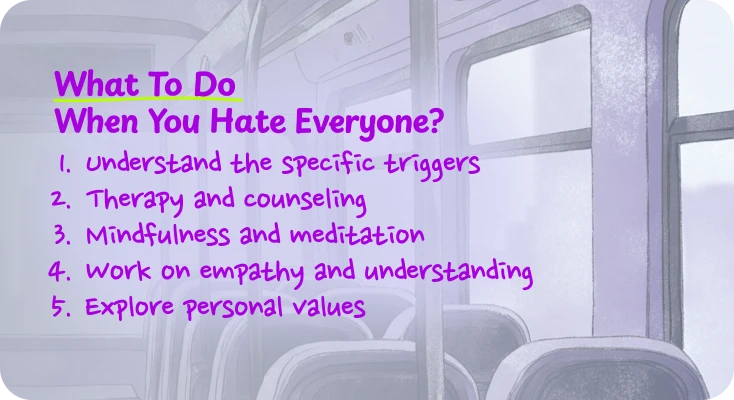
Case Study: From Social Anxiety to Hatred and Back
Breeze app user Anna shared her experience of overcoming social anxiety and how she stopped hating people.
“I had always felt uncomfortable in social situations. Since high school, I struggled to speak up, avoided eye contact, and meet new people. I began to avoid parties, small talk, and even the shared kitchen at work to reduce stress.
That withdrawal slowly turned into an internal narrative: “I hate people. They’re shallow, selfish, and exhausting.” I was lonely. Sometimes I wondered, “Why do I push people away?” But dismissing them was easier than facing my fear of rejection.
The turning point came during a panic attack at a work event. That’s when I finally came to in-person therapy and was diagnosed with social anxiety disorder. Then, through months of online therapy and self-reflection exercises with the Breeze app, like journaling and mood notes, I began to recognize that my “hatred” was actually a coping strategy, hiding fear, pain, and a deep sense of inadequacy.
With support, cognitive-behavioral tools, and stress-management techniques, I began to open up. It turns out I didn’t really hate people. I just thought they’d hate me first.”
Sources
- Clara Pretus, Jennifer L. Ray, Yael Granot, William A. Cunningham, Jay J. Van Bavel. The psychology of hate: Moral concerns differentiate hate from dislike. November 2022
- Susan M. Swearer, Shelley Hymel. Understanding the Psychology of Bullying. May–June 2015
- Salman Shafiq. Hatred is a mindset triggered by stressful external events, negative personal or group interpretations, and unhealthy social environments. June 2023
- Zlatan Krizan, Omesh Johar. Envy Divides the Two Faces of Narcissism. January 2012
- Metzger N. A mad yearning for solitude: Timon the Misanthrope and his relevance to the study of ancient psychopathology. June 2023
- Tao H, Guo S, Ge T, Kendrick KM, Xue Z, Liu Z, Feng J. Depression uncouples brain hate circuit. January 2013
Disclaimer
This article is for general informative and self-discovery purposes only. It should not replace expert guidance from professionals.
Any action you take in response to the information in this article, whether directly or indirectly, is solely your responsibility and is done at your own risk. Breeze content team and its mental health experts disclaim any liability, loss, or risk, personal, professional, or otherwise, which may result from the use and/or application of any content.
Always consult your doctor or other certified health practitioner with any medical questions or concerns
Breeze articles exclusively cite trusted sources, such as academic research institutions and medical associations, including research and studies from PubMed, ResearchGate, or similar databases. Examine our subject-matter editors and editorial process to see how we verify facts and maintain the accuracy, reliability, and trustworthiness of our material.
Was this article helpful?
